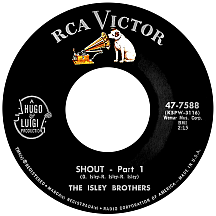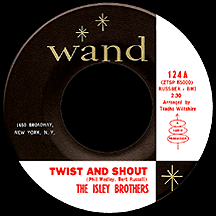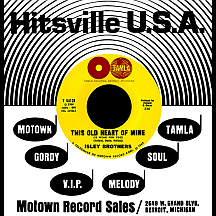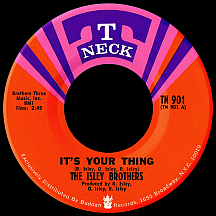THE ISLEY BROTHERS
All the members of Lincoln Heights, Ohio's Isley family had musical talent. The four oldest of six brothers set out to be a gospel quartet, but after an unforeseen tragedy, the other three decided to change direction and try performing secular music as a rhythm and blues act. With the addition of other family members throughout the years, The Isley Brothers have impacted the music industry and infused the rest of the world with funk for more than a half-century. Father O'Kelly sang in church and his sons followed suit; in 1954 the original foursome consisted of 16-year-old O'Kelly, Jr. with younger siblings Rudolph, Ronald and 12-year-old Vernon Isley. A major accident occurred later that year when Vernon was riding his bike to school. He was hit by a truck and killed, a devastating setback for the entire family that numbed ambition and halted any momentum the brothers had gained to that point.
After about a year, with the support of their parents, the three began emulating pop and rhythm and blues acts (an obvious temptation considering their ages) in place of the gospel influences they had been brought up with. Taking a risk, the brothers traveled by bus to New York City in 1956 and approached several record labels. With a well-integrated vocal expertise beyond their years, they managed to get a single released by the small Teenage label, and it was a promising one at that; uptempo doo wop tune "The Cow Jumped Over the Moon" (with a lead vocal by Ronald reminiscent of Frankie Lymon) was backed with "Angels Cried," identified on the label as a "blues ballad."
The record caught the ear of George Goldner, who signed them to a limited contract and released singles by the group during 1957 and '58 on various labels he owned. The songs displayed a versatile range for three so young: "The Drag" (a guitar scorcher on Mark-X, written by future electric organ expert Dave "Baby" Cortez) and self-penned pleasures like "Don't Be Jealous" (a tight harmony ballad on the Cindy label) and "I Wanna Know (Baby Will You Be Mine)" (a looser midtempo jam with rockin' piano, released on Gone, the label misspelling Isley as "Isely"), Ronald's vocal performance on the latter clearly indicating the group's soon-to-be trademark sound in its early stages.
In 1959, the family moved from the Cincinnati suburb they called home to Englewood, New Jersey, minutes away from the Hudson River leading into New York. With instant access to the big city, and several singles in the can, came the opportunity to hound the big label honchos on a daily basis until someone gave in. Producers Hugo Peretti and Luigi Creatore were familiar with the Isley name, if not some of their recordings, thanks to an earlier association with Goldner. Recently hired by RCA Victor to help target the younger music fans that were suddenly a much larger percentage of the record buying population, they signed the brothers and produced their RCA debut, the Aaron Schroeder-Sid Wayne tune "I'm Gonna Knock on Your Door" (the record didn't spark much interest but was a hit three years later by teen singer Eddie Hodges). They got their next shot with "Shout"...and music fans across the U.S. were treated to a strong dose of the trio's infectious energy.
Jackie Wilson had become a star by that time and the Isleys were big fans. While appearing at the Howard Theater in Washington, D.C., they launched into a rendition of Wilson's hit "Lonely Teardrops," taking the 'Say you will' part of the lyrics (by Berry Gordy and Tyran Carlo) and attaching their own ad-libbed addendum, 'You know you make want to shout!...shout!' several dozen times with gradually increasing recklessness. A promotional rep for RCA was there that night and made note of the effect it had on the audience, similar to the buoyant enthusiasm found in churches when the spirit moves the congregation. Hugo and Luigi recorded a four and a half minute, two-part single of the song, the brothers brought in the organist from their church in Cincinnati to give it a gospel credibility, and though it wasn't an extremely high-charting hit, "Shout" (credited to all three brothers as songwriters) established the act in a big way.
The RCA Victor recordings of the Isley Brothers possessed an electrifying energy, but in spite of strong follow-up singles like "Respectable" (another all-Isley-penned killer), they had no more hits with the label and were dropped within two years. After a few singles for Atlantic Records, Luther Dixon of Scepter showed interest and signed them to a contract in 1962 as an act on the company's Wand subsidiary, a personal outlet for Dixon discoveries. Before they had a chance to release anything on the new label, Joey Dee and the Starliters came out with a version of "Shout," recorded live at New York's Peppermint Lounge as a follow-up to the group's number one smash, "Peppermint Twist." RCA made attempts to compete by reissuing the Isleys' 1959 original and both versions briefly appeared on the charts at the same time, but in April Dee's record went top ten while the Isley single had fallen out of sight. O'Kelly, Rudy and Ron faced an uncertain future; they needed another hit record.
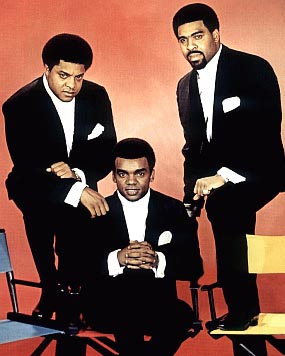
On the surface, "Twist and Shout" may have seemed like an attempt to rekindle (or recycle) the success of "Shout," but in reality the two had little in common beyond the similar titles. The song, composed by Phil Medley and Bert Berns (as Bert Russell), was recorded by The Top Notes under the supervision of Phil Spector. The result, released by Atlantic in late '61, was denounced by Berns, who considered it a complete mishandling of the material. Bert produced the Isley remake several months later and, not surprisingly, their version delivered his vision and then some. Though the song's tempo was a bit too fast for dancing the Twist, radio couldn't deny the electrifying track. It spent the entire summer of 1962 on the charts, peaking in the top 20 while landing them on the R&B chart for the first time, going all the way to number two.
They milked the twist concept for a mid-charting follow-up written by the brothers, "Twistin' With Linda," then delivered a screamin' performance of original composition "Nobody But Me" before leaving Wand for United Artists in '63. Other soon-to-be-famous recording acts were fans of the Isley Brothers, among them The Beatles, who recorded a rough, rockin' cover of "Twist and Shout," with a lead vocal by John Lennon, at the end of their one-day session for debut album Please Please Me. Brian Poole and the Tremeloes jumped on the bandwagon with a suspiciously similar version and scored a top ten U.K. hit with it in the summer of '63. While never intended for single release, the Beatles' one-take wonder was issued on 45 in America by Vee Jay Records (on its Tollie label) during the Fab Four frenzy of 1964 and it became a major hit; the Isley influence had been felt in the rock world. Within weeks, Scotland's Lulu and the Luvers brought "Shout" back again and landed in the U.K. top ten.
At United Artists, the brothers gave in to gimmickry ("Surf and Shout" seemed doomed from the outset), but made an unintentional investment in their future with "Who's That Lady," a soulful midtempo track recorded in 1964; later they would recycle the song to profitable advantage. Another move with long-term (but belated) benefits came late in the year when they established T-Neck Records, following the lead of several other artists who had made a similar move in efforts to have more control over their work. One single, "Testify," came out on T-Neck, featuring a bluesy lead guitar by "Chitlin' Circuit" player Jimmy James (who became a star a few years later under his real name, Jimi Hendrix). After that they returned to Atlantic and abandoned T-Neck (for the time being, at least); "Simon Says" made a little noise in 1965 but they left Atlantic mid-year to try their luck in Detroit with Gordy's Motown Records, which had become a major force over the previous few years. Their debut single, "I Hear a Symphony," written by Eddie Holland, Lamont Dozier and Brian Holland, was a significant departure from earlier efforts, setting them smack dab in the middle of "The Motown Sound." Released on the V.I.P. label that summer it barely registered, but a few months later the song became a number one smash for The Supremes, their sixth over a span of just 15 months.
Gordy moved the Isley Brothers to the Tamla label in early 1966 and they scored with "This Old Heart of Mine (Is Weak For You)," another great song from the creatively and commercially dominant Holland-Dozier-Holland team. Just over three years had passed since "Twist and Shout," roughly the same amount of time between "Shout" in '59 and that second hit. By an unusual coincidence, the same length of time, give or take a month, went by before the group's next major U.S. hit. In the meantime they kept chugging along with several minor Tamla releases, all composed by various Motown staff writers: "I Guess I'll Always Love You," "Got to Have You Back" and others. United Artists reacted by releasing a two-year-old recording, "Love is a Beautiful Thing," on its Veep subsidiary. Norman Whitfield and Barrett Strong felt "That's the Way Love Is" would be a hit and they were right, but it wasn't the Isley Brothers recording that made it; instead, Marvin Gaye went top ten with the song in 1969.
The music of the Isley Brothers seemed to be more popular within the music industry than with radio listeners or record buyers; more rock acts stepped up with their own interpretations of songs written and originally recorded by O'Kelly, Rudy and Ron, but these latest enthusiasts were geographically much closer to the trio's home. Cleveland band The Outsiders landed a top 20 hit in the summer of '66 with "Respectable" and The Human Beinz of Youngstown, Ohio scored a top ten smash with a rocking "Nobody But Me" in early '68. The brothers' Motown output had a delayed reaction in England; when "This Old Heart of Mine" hit the top ten there in November 1968, the Isleys did an extensive tour of Europe and Britain, hitting the U.K. top ten a second time in the spring of '69 with a Tamla track written by Ivy Jo Hunter and Beatrice Verdi, "Behind a Painted Smile." By that time the group had departed Motown, more determined than ever to exercise creative freedom while taking complete control of their future, for better or worse.
In 1969 the brothers reestablished the T-Neck company, setting up a distribution deal with Buddah Records. "It's Your Thing," the first of many songs written, produced and arranged by the trio, caught on quickly in March '69 and blasted its way to number two on the pop charts in May, held off the top spot by The 5th Dimension's phenomenally popular "Aquarius/Let the Sunshine In." The first certified million seller for the Isleys, "It's Your Thing" was also their first to reach number one on the R&B charts. An infectiously funky track (more a natural progression for them than a premeditated move), the song signaled a turning point and confirmed the decision, attempted a few years earlier and finally made into reality, to become an independent entity in the music business. The follow-up, "I Turned You On," set a new precedent as well: never before had they followed a top 40 pop/top ten R&B hit with another that reached the same levels. Successive efforts ("Black Berries," "Was it Good to You?") grew progressively more complex. They were on to something, a sound that would serve them well through most of the coming decade.
The '70s started with a bang; in March they won the Grammy Award in the category Best Rhythm and Blues Vocal Performance by a Duo or Group for "It's Your Thing." The family act expanded around that time, adding guitar player Ernie and baby brother Marvin Isley, both still in their teens. Brother-in-law Chris Jasper also came on board in the early '70s. Top-selling albums and hit singles became the norm for several years, "That Lady" (a remake of ""Who's That Lady") in 1973 and aggressive protest song "Fight the Power" in '75 the standouts. In the '80s they focused more on smooth romantic soul with hits like "Between the Sheets" while Ernie, Chris and Marvin formed Isley-Jasper-Isley, scoring several hits including the number one Black (formerly R&B) chart hit "Caravan of Love."
O'Kelly Isley died unexpectedly from a heart attack at the age of 48, in 1986. Rudy and Ron kept going with various family members joining in (including Ernie and Marvin at various times), continuing to make "Contagious" hit music in the 21st century. Marvin has since passed away, while Ronald Isley has kept the band going strong and I have a feeling as long as there are new generations of family members to keep The Isley Brothers in business, sometime around 2059 they'll be singing "Shout," no doubt, while celebrating their 100th year of success in the music industry.
NOTABLE SINGLES:
- The Cow Jumped Over the Moon /
Angels Cried - 1957 - The Drag - 1957
- Don't Be Jealous - 1958
- I Wanna Know (Baby Will You Be Mine) - 1958
- Shout - 1959
- Respectable - 1960
- Twist and Shout - 1962
- Twistin' With Linda - 1962
- Nobody But Me - 1963
- Testify - 1964
- Simon Says - 1965
- I Hear a Symphony - 1965
- This Old Heart of Mine (Is Weak For You) - 1966
- Take Some Time Out For Love - 1966
- I Guess I'll Always Love You - 1966
- Love is a Wonderful Thing - 1966
- Got to Have You Back - 1967
- That's the Way Love Is - 1967
- Take Me in Your Arms (Rock Me a Little While) - 1968
- Behind a Painted Smile - 1968
- It's Your Thing - 1969
- I Turned You On /
I Know Who You Been Socking it To - 1969 - Black Berries - 1969
- Was it Good to You? - 1969
- Bless Your Heart - 1969
- Keep on Doin' - 1970
- Freedom - 1971
- Love the One You're With - 1971
- Lay-Away - 1972
- Pop That Thang - 1972
- That Lady - 1973
- Fight the Power - 1975
- For the Love of You - 1975


